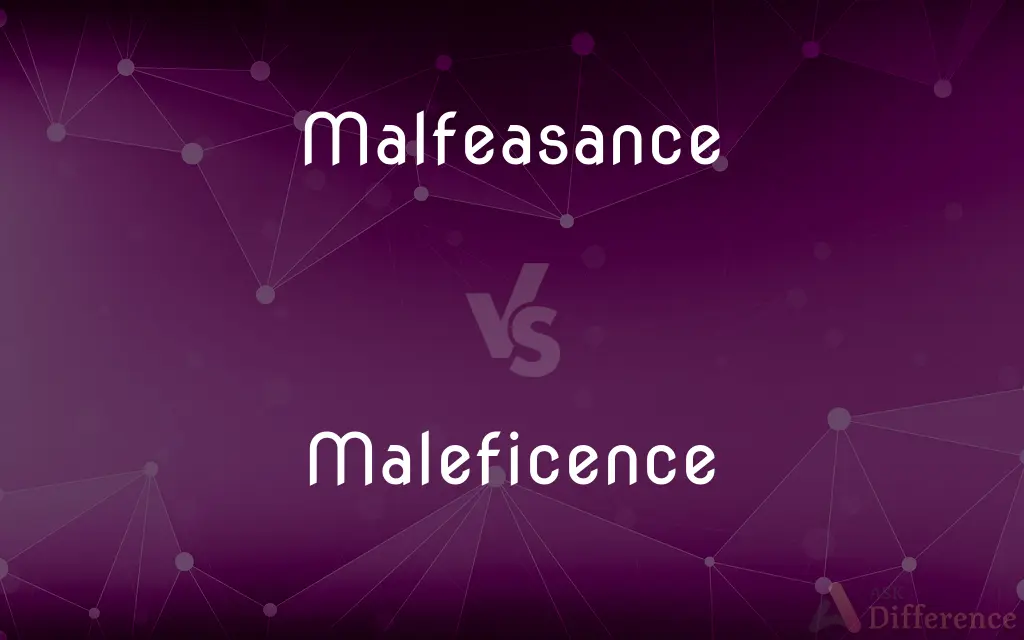Malfeasance vs. Maleficence — What's the Difference?
By Tayyaba Rehman & Urooj Arif — Updated on April 27, 2024
Malfeasance refers to the performance of an act that is illegal or wrongful, typically by a public official; maleficence involves actions that intentionally cause harm or evil.

Difference Between Malfeasance and Maleficence
Table of Contents
ADVERTISEMENT
Key Differences
Malfeasance is a legal term specifically used to describe an act of misconduct or wrongdoing, especially by someone in a position of authority, such as a public official. On the other hand, maleficence is a broader ethical term referring to actions that intentionally inflict harm or evil upon others.
Malfeasance typically involves the violation of legal or formal obligations. It is often used in contexts such as political corruption or legal breaches by officials. Whereas maleficence encompasses any act where harm is done deliberately, regardless of the perpetrator's role or the legality of the action.
In the context of professional ethics, malfeasance is about the breach of duties and unethical conduct within official roles, emphasizing legal boundaries and expectations. On the other hand, maleficence is concerned with the moral implications of causing harm, applicable across a wide range of human interactions and professional practices.
Malfeasance requires that the wrongful act is connected to the individual’s official capacities and responsibilities. In contrast, maleficence does not require any professional or official capacity and can be committed by anyone, making its scope broader and ethically centered.
While malfeasance is actionable in a court of law, maleficence is typically addressed in ethical discussions or moral adjudications, reflecting its foundation in ethical theory rather than statutory law.
ADVERTISEMENT
Comparison Chart
Definition
Wrongful or illegal act by an official
Intentional action causing harm
Legal/Ethical Framework
Primarily legal
Primarily ethical
Scope of Use
Official misconduct
Broad ethical violations
Requirement
Tied to official capacity
No official capacity required
Context of Application
Legal proceedings, public service
Ethical discussions, healthcare ethics
Compare with Definitions
Malfeasance
Illegal or dishonest activity, especially by a person in power.
She was removed from her position due to proven acts of malfeasance.
Maleficence
The act of committing harm or evil intentionally.
His maleficence in the conspiracy was clear from his actions.
Malfeasance
The performance of an act that is illegal or wrongful, especially by a public official.
The mayor’s malfeasance became evident when audit reports revealed embezzlement of funds.
Maleficence
Ethically wrong actions intended to result in harm or suffering.
The regime's maleficence towards dissenters was universally denounced.
Malfeasance
Intentional conduct that is wrongful or unlawful, especially by an official in their duties.
His malfeasance in office involved accepting bribes from developers.
Maleficence
Deliberate violation of ethics by causing harm to others.
The doctor's maleficence was condemned by the medical board.
Malfeasance
Misconduct or wrongdoing, especially by a public officer.
The public demanded accountability for the official's malfeasance.
Maleficence
Conduct that is harmful and deliberately so.
His maleficence in handling the situation led to a public outcry.
Malfeasance
An act involving corruption or a breach of ethics.
The investigation uncovered several instances of malfeasance by the elected official.
Maleficence
Actions taken with the intention to cause detrimental effects.
The policy was criticized for its potential maleficence towards low-income families.
Malfeasance
Misconduct or wrongdoing, especially by a public official.
Maleficence
The doing of harm; mischief.
Malfeasance
Wrongdoing.
Maleficence
Harmful or malicious nature or quality.
Malfeasance
(legal) Misconduct or wrongdoing, especially by a public official and causing damage.
Maleficence
Harmfulness or mischief
Malfeasance
The doing of an act which a person ought not to do; evil conduct; an illegal deed.
Maleficence
Evil doing, esp. to others.
Malfeasance
Wrongful conduct by a public official
Maleficence
Doing or causing evil
Maleficence
The quality or nature of being harmful or evil
Common Curiosities
Can a doctor commit malfeasance?
Yes, if a doctor engages in illegal activities in their official capacity, it can be considered malfeasance.
Who might be affected by maleficence in healthcare?
Patients can be affected by maleficence if healthcare professionals perform actions that intentionally harm them, such as withholding necessary treatment without valid reason.
What distinguishes malfeasance from maleficence?
Malfeasance refers to illegal or wrongful acts within an official capacity, while maleficence encompasses any intentional harm or evil.
Is maleficence always illegal?
Not necessarily; maleficence refers to ethically harmful actions, which may not always breach legal statutes.
Are all unethical acts by officials considered malfeasance?
Only if they are connected to the official's role and duties and involve illegal or wrongful actions.
Does maleficence require intent?
Yes, maleficence requires intentional harm or infliction of evil.
How is malfeasance proven in court?
Proving malfeasance involves demonstrating that the official acted unlawfully or wrongfully within their duties.
What are the consequences of malfeasance?
Consequences can include dismissal from position, legal action, and damage to reputation.
Can an act of maleficence be accidental?
No, by definition, maleficence involves deliberate intent to cause harm.
Can a business commit maleficence?
Yes, businesses can commit maleficence if they intentionally take harmful actions, such as producing dangerous products knowingly.
Share Your Discovery

Previous Comparison
Bowfin vs. Burbot
Next Comparison
Travelling vs. TravelingAuthor Spotlight
Written by
Tayyaba RehmanTayyaba Rehman is a distinguished writer, currently serving as a primary contributor to askdifference.com. As a researcher in semantics and etymology, Tayyaba's passion for the complexity of languages and their distinctions has found a perfect home on the platform. Tayyaba delves into the intricacies of language, distinguishing between commonly confused words and phrases, thereby providing clarity for readers worldwide.
Co-written by
Urooj ArifUrooj is a skilled content writer at Ask Difference, known for her exceptional ability to simplify complex topics into engaging and informative content. With a passion for research and a flair for clear, concise writing, she consistently delivers articles that resonate with our diverse audience.
















































